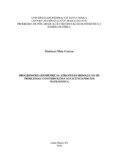| dc.creator | Correa, Matheus Metz | |
| dc.date.accessioned | 2021-10-19T19:43:48Z | |
| dc.date.available | 2021-10-19T19:43:48Z | |
| dc.date.issued | 2020-08-14 | |
| dc.identifier.uri | http://repositorio.ufsm.br/handle/1/22473 | |
| dc.description.abstract | This dissertation presents an investigation, as a case study, undertaken in the second semester of 2019, on the teaching of Geometric Progression (PG) using the Teaching-Learning-Evaluation Methodology of Mathematics through the Resolution of problems in higher education. The subjects were undergraduates in Mathematics from the Federal University of Santa Maria (UFSM) enrolled in the Complimentary Undergraduate Course (DCG) entitled Problem Solving. The motivation for this research was due to concerns regarding how to teach Mathematics in schools, as the memorization and repetition of exercises and/or formulas entails, to the students, a mechanical learning, to which, generally, they are not allowed to assign meanings. The main objective of the study is verifying what contributions are made to the teaching-learning of PG by the undergraduate students in Mathematics through the Methodology of Teaching-Learning – Evaluation of Mathematics through Problem Solving, proposed by Onuchic and Allevato (2011). The data collection occurred within seven meetings, each of which sought to contemplate a specific concept of PG. The research has empirical character and a qualitative approach, in which questionnaires, observations during activities, field diaries, audio recordings and registers of the students were used as data collection tools. From the meetings, three axes of analysis were listed: The previous concepts as a triggering agent in the learning of new concepts in the Teaching-Learning-Evaluation Methodology of Mathematics through Problem Solving, The collaborative and cooperative work in the construction of the personal and professional knowledge of undergraduates of Mathematics from UFSM, and Challenges and possibilities in the use of the Teaching-Learning-Evaluation Methodology of Mathematics through problem solving. Although the collaborative and cooperative work did not have its essence present in all the meetings, it was a fundamental part for the teaching-learning-evaluation process of the undergraduates in Mathematics, specially, the content of PG. Through this methodology, students were able to realize that memorizing formulas, theorems and/or axioms is not always necessary in the teaching of Mathematics. | eng |
| dc.description.sponsorship | Coordenação de Aperfeiçoamento de Pessoal de Nível Superior - CAPES | por |
| dc.language | por | por |
| dc.publisher | Universidade Federal de Santa Maria | por |
| dc.rights | Attribution-NonCommercial-NoDerivatives 4.0 International | * |
| dc.rights.uri | http://creativecommons.org/licenses/by-nc-nd/4.0/ | * |
| dc.subject | Matemática discreta | por |
| dc.subject | Resolução de problemas | por |
| dc.subject | Ensino superior | por |
| dc.subject | Ensino e aprendizagem de matemática | por |
| dc.subject | Discreet mathematics | eng |
| dc.subject | Problem solving | eng |
| dc.subject | Higher education | eng |
| dc.subject | Mathematics teaching and learning | eng |
| dc.title | Progressões geométricas através da resolução de problemas: contribuições ao licenciando em matemática | por |
| dc.title.alternative | Geometric progressions through problem-solving: contributions to the undergraduate in mathematics | eng |
| dc.type | Dissertação | por |
| dc.description.resumo | Esta dissertação apresenta uma investigação, na forma de um estudo de caso, realizado no segundo semestre de 2019, sobre o ensino da Progressão Geométrica (PG) utilizando a Metodologia de Ensino-Aprendizagem-Avaliação de Matemática através da Resolução de Problemas no Ensino Superior. Os sujeitos eram licenciandos em Matemática da Universidade Federal de Santa Maria (UFSM) matriculados na Disciplina Complementar de Graduação (DCG) intitulada Resolução de Problemas. A motivação para essa pesquisa ocorreu por conta de inquietações quanto à forma de se ensinar a Matemática nas escolas, na medida em que a memorização e repetição de exercícios e/ou fórmulas acarreta, ao discente, uma aprendizagem, muitas vezes, mecânica, onde a ele não é, em geral, permitido atribuição de significados. O objetivo central do trabalho é verificar quais as contribuições propiciadas ao ensino-aprendizagem da PG de licenciandos em Matemática por meio da Metodologia de Ensino-Aprendizagem-Avaliação de Matemática através da Resolução de Problemas, proposta por Onuchic e Allevato (2011). A coleta de dados ocorreu em sete encontros sendo que cada um deles buscou contemplar um conceito específico da PG. A pesquisa tem caráter empírico e possui uma abordagem qualitativa, na qual foram utilizados como instrumentos de coleta de dados: questionários, observações durante as atividades, diários de campo, gravações de áudios e dos registros dos alunos. Mediante os encontros elencaram-se três eixos de análise: Os conceitos prévios como agente desencadeador na aprendizagem de novos conhecimentos na Metodologia de Ensino-Aprendizagem-Avaliação de Matemática através da Resolução de Problemas; O trabalho colaborativo e cooperativo na construção do conhecimento pessoal e profissional de licenciandos em Matemática da UFSM e Desafios e possibilidades no uso da Metodologia de Ensino-Aprendizagem-Avaliação de Matemática através da Resolução de Problemas. Apesar do trabalho colaborativo e cooperativo não ter sua essência presente em todos os encontros, ele foi parte fundamental para o processo de ensino-aprendizagem-avaliação dos licenciandos em Matemática, em especial ao conteúdo de PG. Através dessa metodologia os alunos puderam perceber que a memorização de fórmulas, teoremas e/ou axiomas não é sempre necessária no ensino da Matemática. | por |
| dc.contributor.advisor1 | Noguti, Fabiane Cristina Höpner | |
| dc.contributor.advisor1Lattes | http://lattes.cnpq.br/1247690905207985 | por |
| dc.contributor.referee1 | Justulin, Andressa Maria | |
| dc.contributor.referee2 | Tonet, Luciane Gobbi | |
| dc.creator.Lattes | http://lattes.cnpq.br/3249505034924516 | por |
| dc.publisher.country | Brasil | por |
| dc.publisher.department | Educação | por |
| dc.publisher.initials | UFSM | por |
| dc.publisher.program | Programa de Pós-Graduação em Educação Matemática e Ensino de Física | por |
| dc.subject.cnpq | CNPQ::CIENCIAS HUMANAS::EDUCACAO | por |
| dc.publisher.unidade | Centro de Ciências Naturais e Exatas | por |



